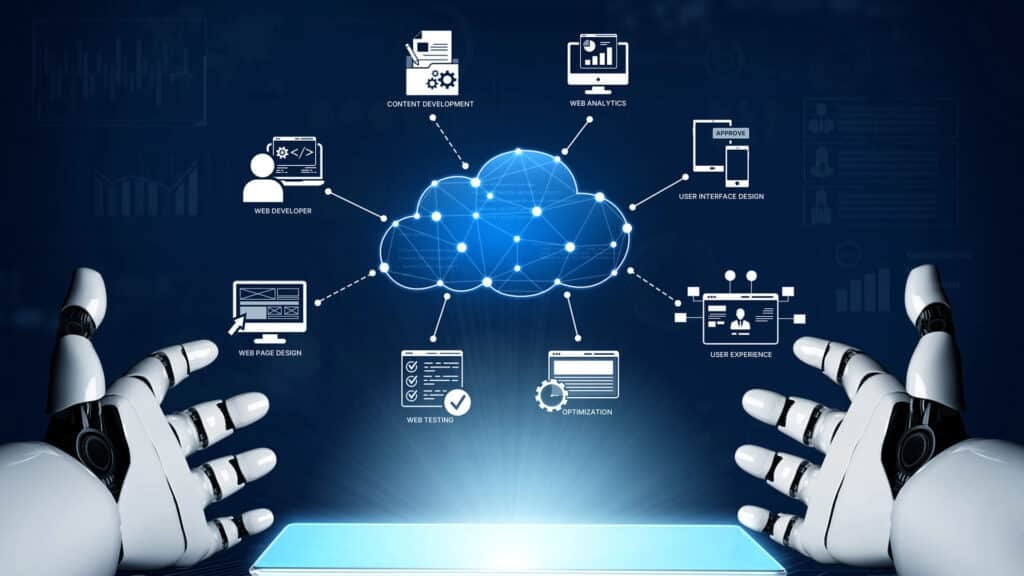Analyst(s): Mitch Ashley, Nick Patience, Keith Kirkpatrick
Publication Date: June 6, 2025
What is Covered in this Article:
- Microsoft’s bold AI strategy and its impact on software development
- The evolution of GitHub Copilot to peer programming with AI agents
- New capabilities for Copilot Tuning and multi-agent orchestration
- Microsoft’s commitment to open standards and open source in the AI era
- Key takeaways and what to watch for in the adoption of agentic AI
The Event – Major Themes & Vendor Moves: The 2025 installment of Microsoft’s developer conference, Microsoft Build, was held in Seattle, Washington, from May 18 to 21. 2025 marked a pivotal inflection point for Microsoft and the developer community, as CEO Satya Nadella’s keynote shifted AI from an aspect of software development to center stage. Nadella set the tone by describing an “agentic web” where AI evolves from an assistant to agentic agents that perform work, workflows, and multi-step operations for developers and software teams. Key themes from the conference include:
Theme 1: The elephant in the room – will developers still have jobs in the era of agentic AI? Microsoft began the conference by addressing this question head-on, describing Microsoft’s core roots as stemming from software development that dates back to the company’s origins. “We understand developers because we’ve always been software developers,” and similar statements were heard in the opening keynote and throughout the conference’s discussions. Microsoft leadership played a key role in stating that we are creating a new future for how we build software. Microsoft was also clear that they don’t have all the answers, a sentiment not typically heard from Microsoft. And by working with the development community, they will together build the path towards agentic AI development.
Theme 2: Microsoft is in on AI. Did I mention that Microsoft is all in on AI? Yes, they’re all in. Microsoft’s AI era is akin to other historical bets, including Bill Gates’ goal of “a computer on every desk and in every home”, believing the Internet was the future, and Satya’s strategy to move Microsoft to the cloud. End-user computing, applications, software development, data, business analytics, enterprise applications, and cybersecurity are all underpinned, if not reengineered, with AI.
Theme 3: Executing on the AI Strategy. The announcements at Microsoft Build were cohesive and connected, rather than a hodgepodge of AI product features, projects, or the newest shiny objects. Microsoft concentrated its developer AI announcements across six areas: 1) AI agents and copilot, 2) developer tools, 3) AI and data platforms, 4) open/agentic web, 5) Infrastructure, and 6) enterprise AI.
Theme 4: Microsoft with some GitHub ethos. The message was no longer that Microsoft has the answers and will provide everything developers will need. Instead, there will be more experimentation, quicker public preview cycles, contributions to open-source and open standards (MCP, A2A), and seeking continuous feedback from the developer community. Microsoft recognized that developer ecosystems involve technologies from multiple vendors, including development tools, AI, DevOps, and infrastructure companies.
The following are areas where Futurum’s beliefs are essential from a developer community perspective. While this report doesn’t attempt to cover every announcement from the conference, a summary of the announcements and the respective release timeframes can be found here.
GitHub Copilot’s Agentic enhancement to restore ‘joy’ to programming
Today, most use cases for AI in software development involve AI as an aid or augmentation to developers performing code-writing tasks. Microsoft Build marked the point where AI shifts from being subordinate to developers to becoming a peer programmer alongside them. Microsoft made some bold claims about how AI within GitHub Copilot will shift from AI-assisted programming to true ‘peer programming’ with agents acting as peers. The new capabilities enable developers to assign coding tasks directly to AI agents, which can now independently analyze problem statements, execute code, and return completed work for human review.
According to Microsoft, by automating repetitive coding tasks, GitHub Copilot’s agents can reduce development backlogs, enabling human developers to focus on more complex and creative work. The approach maintains essential human oversight, ensuring quality and alignment with project goals. Beyond the technical capabilities, Microsoft claims to enhance developer productivity, eliminate mundane coding work, and restore “joy” to software development while providing organizations with development capacity they previously couldn’t afford.
Copilot Tuning and Agent Orchestration
For Microsoft 365 Copilot, the company announced Copilot Tuning, which enables customers to utilize their data to train Copilot’s LLM to power agents that can perform domain-specific tasks, including document summarization, Q&A generation, and document generation, without requiring any coding. These agents will operate securely within the Microsoft 365 service boundary.
In addition, with Microsoft 365 Copilot APIs, developers will be able to securely access Microsoft 365 data and capabilities to create custom agents or embed Copilot Chat into apps, all while remaining in compliance with organizational permissions and guardrails. Customers are also now able to use a new Agents & Connectors page in the Microsoft 365 Admin Center to manage Copilot agents throughout their entire lifecycle, across all sources and deployment types.
Microsoft announced multi-agent orchestration, enabling agents to exchange data, collaborate on tasks, and assign work to specific agents based on their capabilities. Orchestration is still relatively new in the world of agentic agents, but it is a much-needed capability to fulfill the promise of what agentic AI can deliver. In addition, Microsoft’s Copilot Control System, deployed in Microsoft 365 Admin Center, allows users to view, enable, disable, assign, block, or remove Microsoft and non-Microsoft agents, permitting Microsoft to serve as a centralized agent hub.
Agents as First-Class Business Entities
Agents created through Copilot Studio and Azure AI Foundry are now treated as business entities with organizational identity and access controls, managed through Microsoft Intra Agent ID. Microsoft also announced data protection by extending Microsoft Purview Information Protection to co-pilot studio agents within the Microsoft Dataverse. While treating agents as essentially users is not a novel concept, Atlassian announced a similar agent approach in 2024. Microsoft’s announcement further solidifies this trend towards managing agents as entities with the same kinds of security controls and identities as end users.
Open Standards and Open-Source
Microsoft announced its support for the Agent2Agent (A2A) protocol, an open standard first introduced by Google at Google Cloud Next, in Copilot Studio and Azure AI Foundry. This protocol enables agents to exchange data and communicate peer-to-peer rather than relying on a central mediator or control plane.
Microsoft demonstrated its serious commitment to the Model Context Protocol by joining the MCP steering committee, ensuring that Microsoft can deliver MCP support across its agent platforms and frameworks, including GitHub, Copilot Studio, Dynamics 365, Azure AI Foundry, Symantec Kernel, Foundry Agents, and Windows 11. Microsoft strengthened its support for MCP by announcing its collaboration with Anthropic and the MCP Steering Committee to help develop the open standard, ensuring it becomes enterprise-class capable. GitHub also collaborated with the MCP Steering Committee to design a registry service for MCP servers, for the discovery and management of MCP implementations, and their metadata configurations and functionality.
A key challenge for deploying AI agents across an enterprise is ensuring they can work seamlessly across disparate processes and data sources. Microsoft introduced MCP-enabled servers for its business applications (Dynamics 365 ERP and CRM), which are designed to standardize how applications provide context to large language models. MCP is designed to help simplify agent development and minimize ongoing maintenance efforts. The Dynamics 365 MCP servers will prioritize security and governance, requiring authentication and enforcing authorization.
GitHub Co-Pilot Chat in VS Code is also being open-sourced as part of the VS Code open-source repository.
Microsoft Embraces the Development Community on the Path to Agentic AI
Analyst Take: Microsoft made a valiant attempt at moving beyond introducing new AI features to taking a more systemic and orchestrated approach to AI, making it the core ingredient of every part of applications, software, and software development. Well, not a strategic pivot that can be accomplished in one developer conference, Microsoft made a very strong statement about not only its commitment but also its execution of its AI strategy.
That said, it’s still essential to acknowledge that the evolution of AI is in its early stages of transforming how software is built and how work is performed by developers, software teams, QA, security engineers, operations personnel, and citizen developers.
Like many vendors, Microsoft has been actively pushing its vision of AI agents, largely leveraging its Copilot approach to move beyond assistance to enabling far greater levels of intelligent process and workflow automation. It addresses two key industry-wide challenges: ensuring that agents can better understand domain-specific requests and that LLMs can better comprehend the context of requests from disparate applications.
Ultimately, generative AI models and AI agents are most effective when they can understand the context of a request, rather than providing a generic response. This capability will be even more important as workflows span not only internal applications but also those that extend beyond the organization. For example, retailers that want to provide customers with real-time insights into order fulfillment across the entire supply chain will need agents that can easily read and interact with data provided by disparate applications and systems. This capability is also critical when requests become increasingly complex and incorporate dependencies that may shift on a continuous basis.
The challenge for Microsoft, particularly with new logos, will be to clearly demonstrate that its Copilot-driven approach to agents is capable of supporting both human-augmented workflows and fully automated agentic flows, with little developer involvement. ROI and time to value will remain the key metrics upon which vendors will be judged.
It remains to be seen how effectively these agents handle nuanced or poorly defined tasks and what level of human intervention will truly be necessary to ensure code quality and prevent errors. The claim of restoring “joy” to software development may overlook the potential for new complexities in managing and collaborating with AI agents. Many new challenges and complexities lie ahead, creating both opportunities and speed bumps in the adoption and use of agentic AI.
While the analysts at Futurum are generally bullish on agentic AI and on bold attempts, such as Microsoft’s, to lay out a strategy and execute it, it’s essential to recognize the long tail of customers, partners, development teams, and users that have to make major transitions in the platforms, technologies, and most importantly, workflows and business processes through the adoption of agentic AI.
Returning to the elephant in the room that kicked off the conference, will developers still have jobs, one of the most insightful breakout sessions during Build was the 4:30 PM Monday panel Pioneering the future: Agentic DevOps with Gene Kim (The Phoenix Project author), Nicole Forsgren (DORA researcher), and Martin Woodward (GitHub) moderated by Andrew Flick (Microsoft) about the future role of development and agentic DevOps. A mainstage roundtable session featuring Microsoft’s CTO, Kevin Scott, CoreAI EVP Jay Parikh, and industry leaders at a future Microsoft Build conference would go a long way toward building the narrative around where we are heading and the role of developers and others in the software development life cycle.
What to Watch:
- Adoption, adoption, adoption. Look for specific customer case studies, in-depth reviews, and validated business outcomes and productivity metrics achieved by customers who have implemented agentic capabilities in their development processes, software, end-user computing, enterprise applications, operations, and cybersecurity.
- “Walk the talk” authenticity in Microsoft’s support and engagement in the development of open standards, open-source, agent frameworks, and orchestration interoperability.
- Next-level adoption and engineering challenges arise as the use of agentic agents increases, both individually and across software teams, throughout the entire software development lifecycle. Challenges will occur, and it’s all about how Microsoft responds.
- Microsoft’s continued adoption of the GitHub “independent developer ethos” and how it impacts Microsoft’s and GitHub’s go-to-market strategies. Developers will challenge its authenticity.
You can read More information about the announcements during Microsoft Build on the company’s website.
Disclosure: Futurum is a research and advisory firm that engages or has engaged in research, analysis, and advisory services with many technology companies, including those mentioned in this article. The author does not hold any equity positions with any company mentioned in this article.
Analysis and opinions expressed herein are specific to the analyst individually and data and other information that might have been provided for validation, not those of Futurum as a whole.
Other insights from Futurum:
Tech Vendors See the Future – Software Development Is the Agentic AI-Proving Ground
Open Source vs. Proprietary AI: Revolution or Just Another Market Split? – Report Summary
Microsoft Q3 FY 2025 Earnings Beat on Strong Cloud and AI Services Growth
MCP Is the New Control Point in AI—Are CIOs Ready for the Lock-In Battle?








